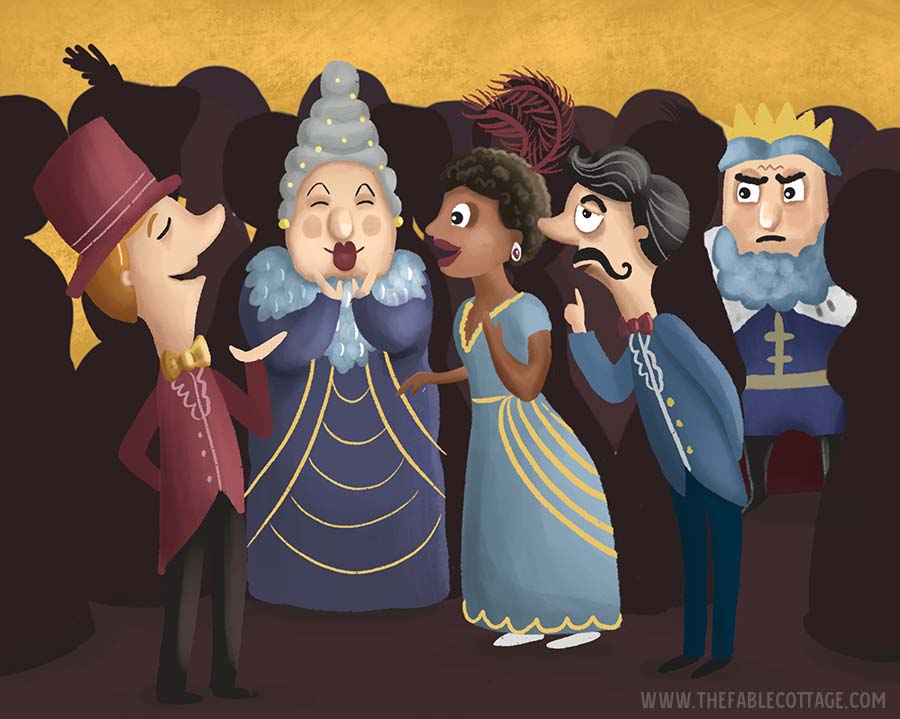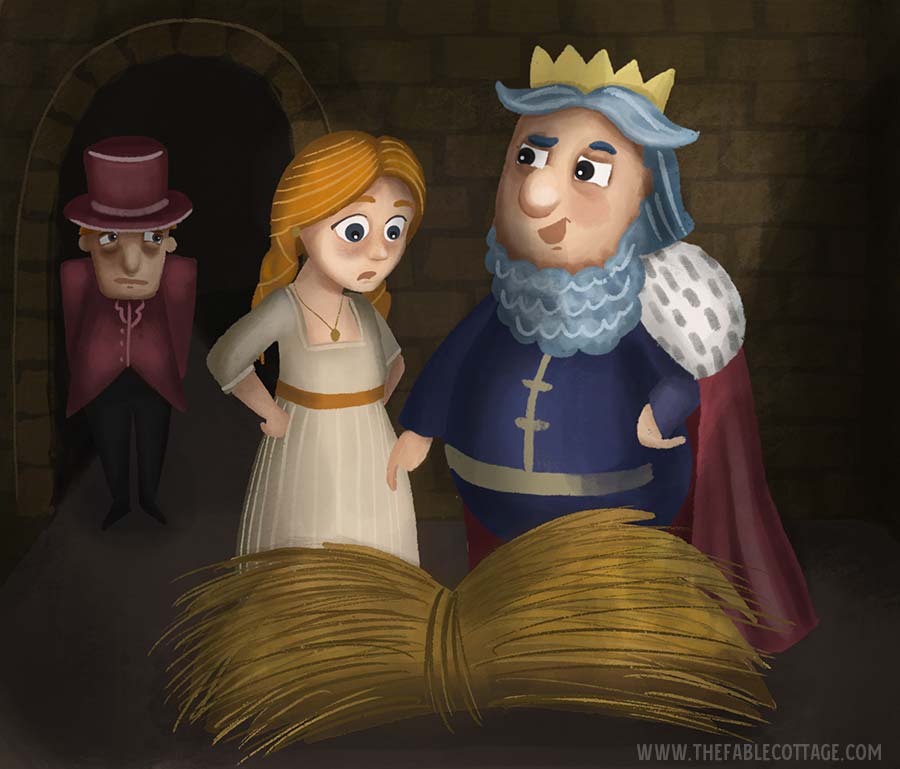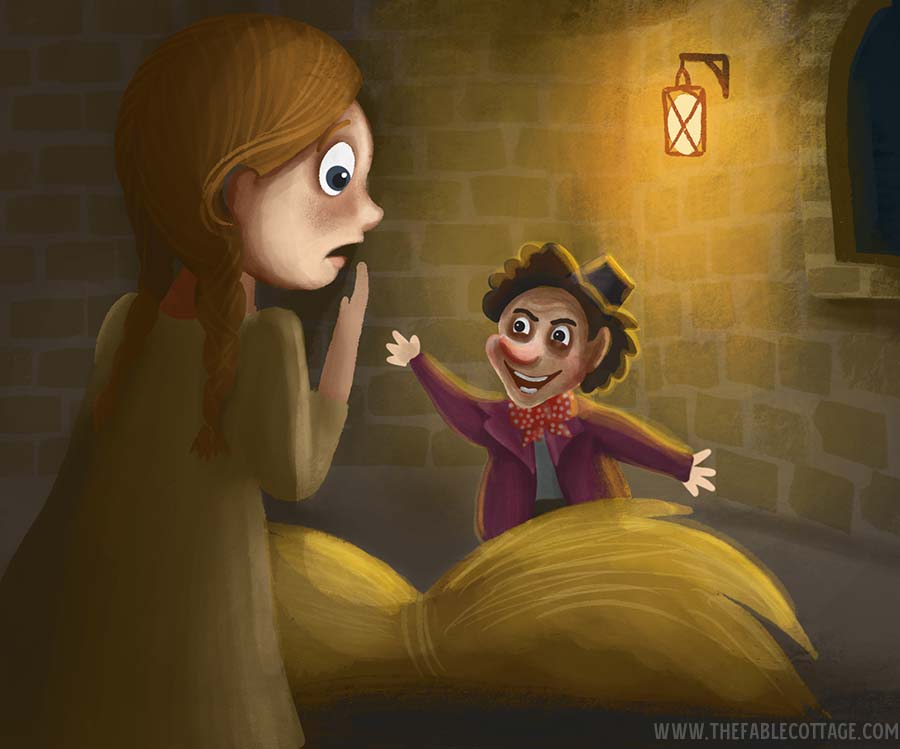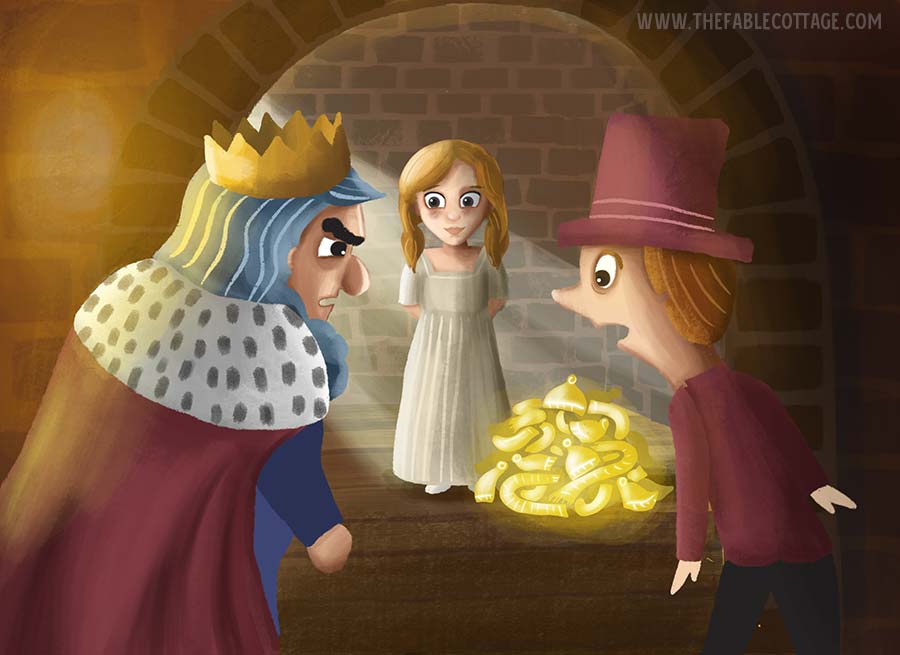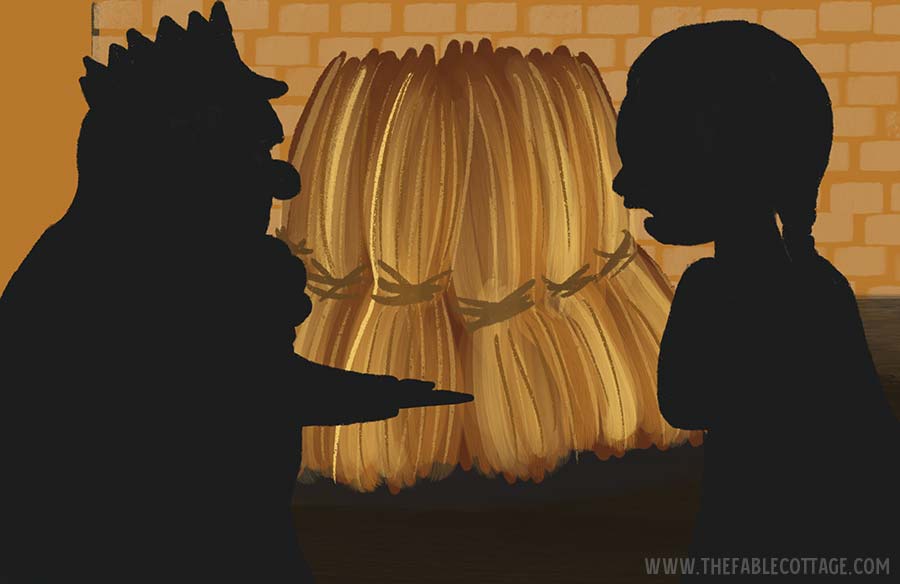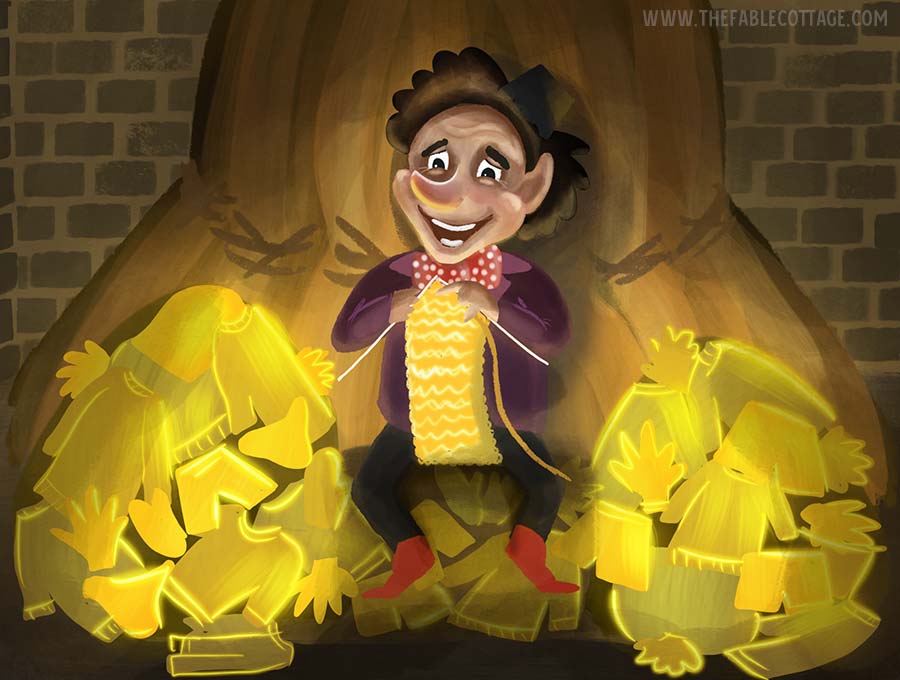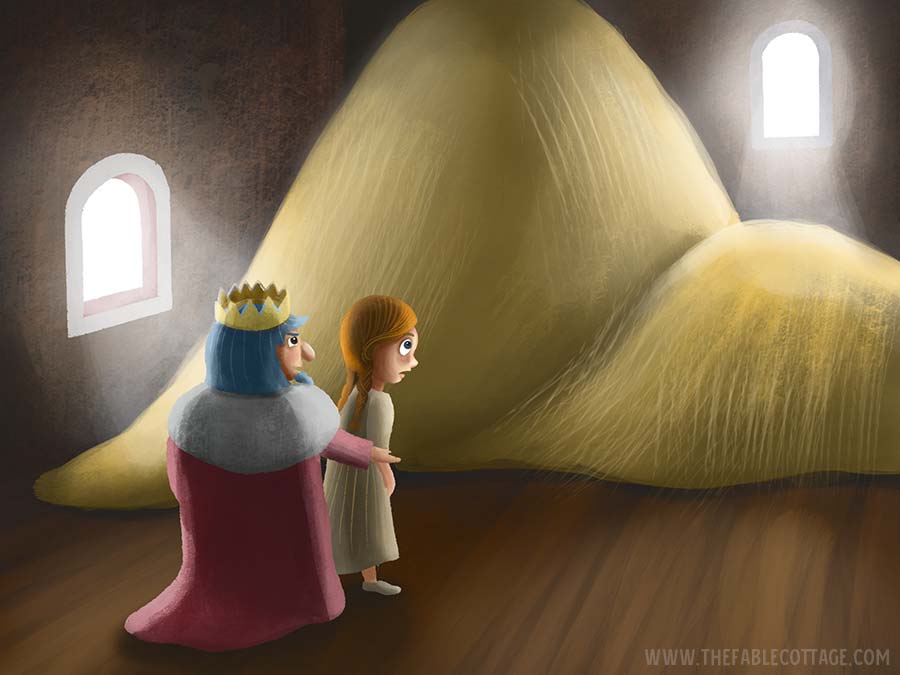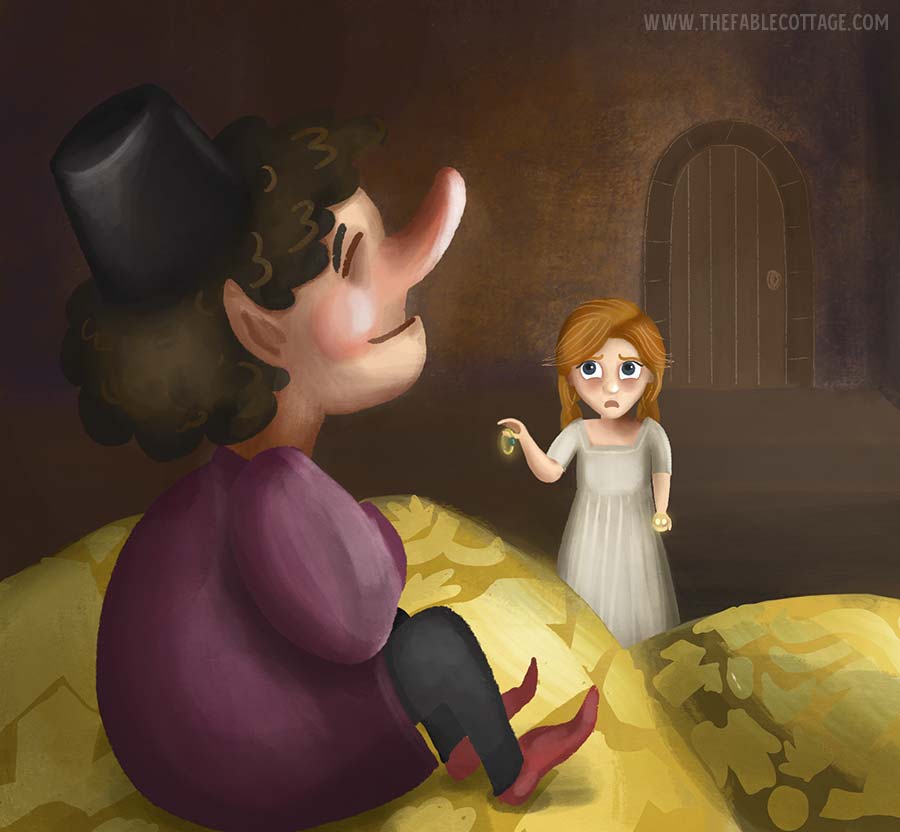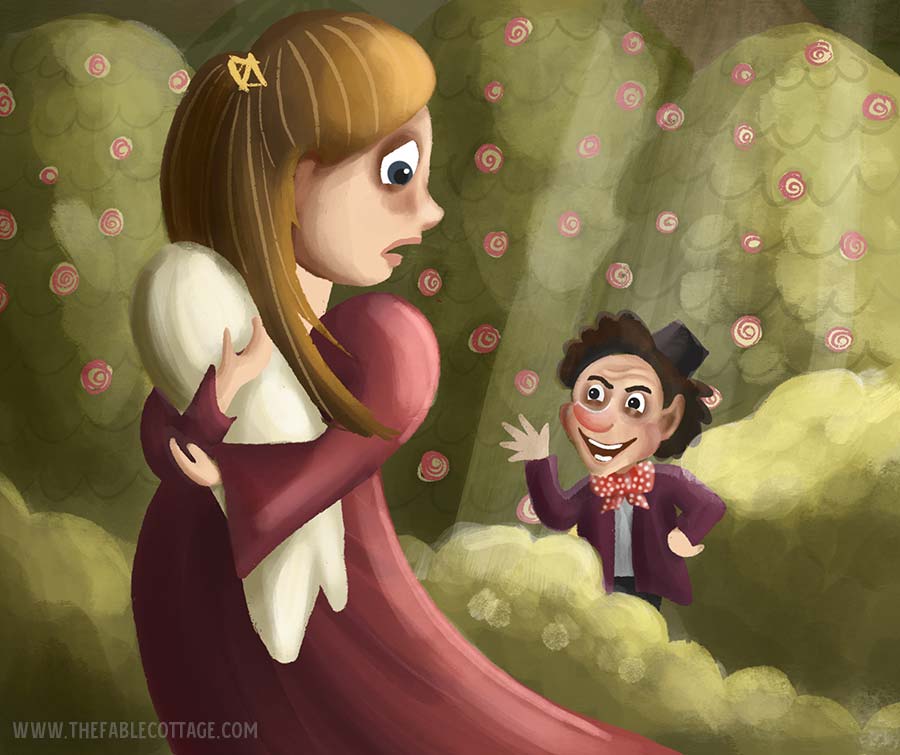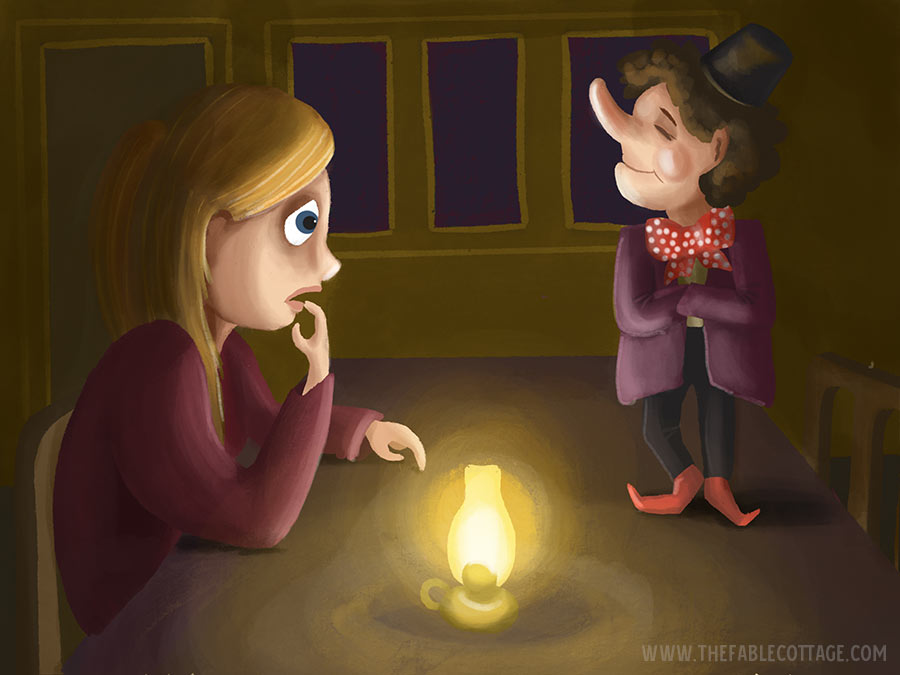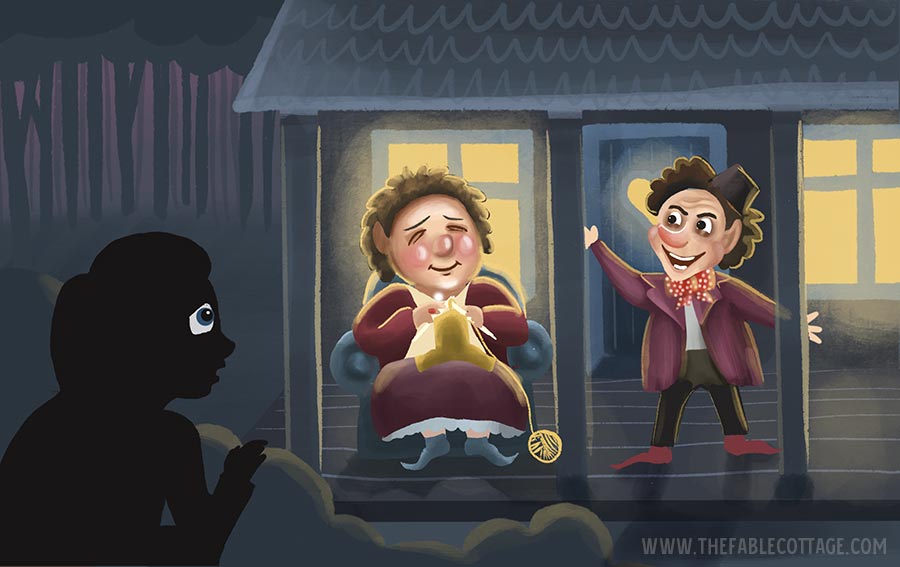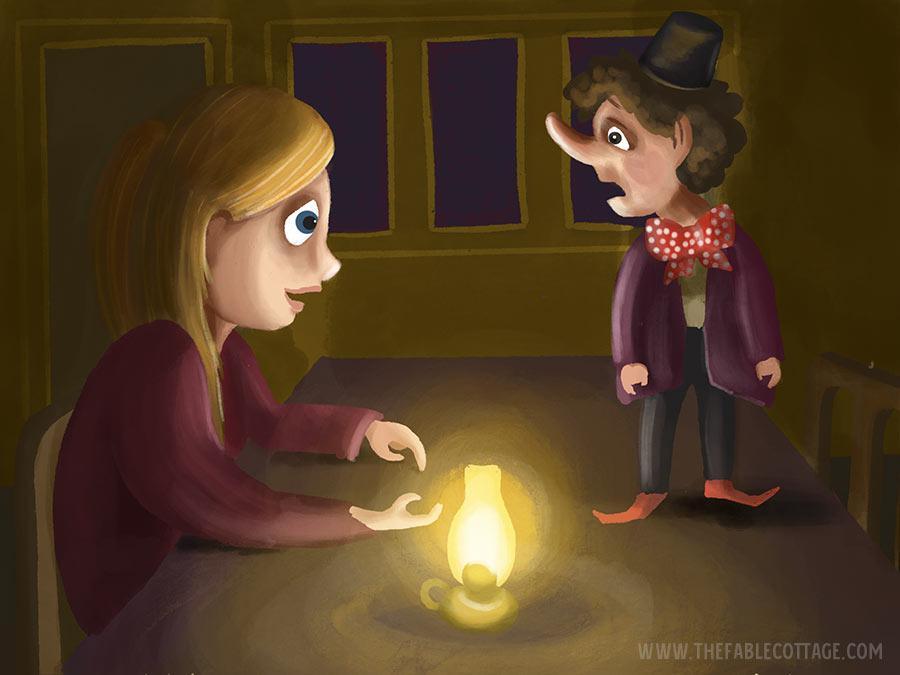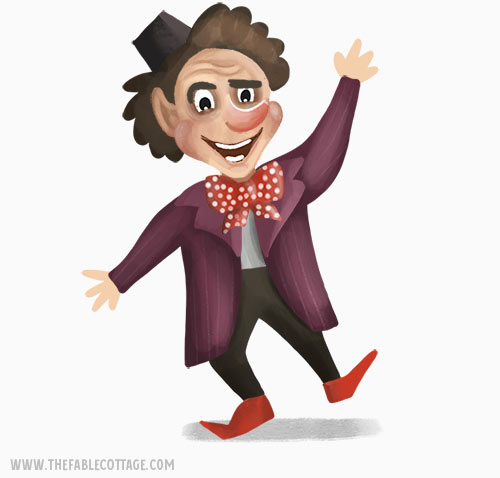C’era una volta un ricco cappellaio che diceva un sacco di bugie. Ma era così ricco che a nessuno importava.
“Oh, sta solo scherzando!” dicevano tutti ridendo.
Once upon a time there was a rich hat-maker who told a lot (a bag) of lies. But he was so rich that nobody cared.
"Oh, he's only joking!" they all laughed (all said laughing).
Quell’uomo ricco amava andare a ballare con le altre persone ricche. Durante i balli, i ricchi se ne andavano in giro e si raccontavano bugie.
This rich man loved to go to dances (go dancing) with other rich people. During the dances, the rich people went around telling lies (and told lies).
“Mio marito ha sparato a un tacchino da tre chilometri di distanza…” disse una ricca signora.
“Mio figlio è così intelligente che insegna ai suoi insegnanti!” disse un ricco signore.
“Il mio gatto è così sveglio che riporta i bastoni come i cani!” disse un’altra ricca signora.
"My husband shot a turkey from three kilometers away ..." said a rich lady.
"My son is so smart that he teaches his teachers!" said a rich gentleman.
"My cat is so clever that he fetches (brings back) sticks like a dog!" said another rich lady.
Il ricco cappellaio voleva partecipare alla conversazione, e così disse la più grande bugia che si era mai sentita:
“Mia figlia è così straordinaria che riesce a trasformare il fieno in oro!”
The rich hat-maker wanted to participate in the conversation, and so he told the biggest lie anyone has ever heard (that has been ever heard):
"My daughter is so extraordinary that she can turn hay into gold!"
Tutti i ricchi annuirono e sorrisero.
“Oh, sì,” dicevano. “Che meraviglia.”
All the rich people nodded and smiled:
"Oh yes," they said. "How wonderful."
D’improvviso, si sentì qualcuno urlare dal fondo della stanza.
“RIESCE A TRASFORMARE IL FIENO IN ORO?”
Era il re! Il re si fece avanti per andare incontro al cappellaio, e tutti quanti si inchinarono e sussultarono.
Suddenly someone could be heard shouting from the back of the room:
"SHE CAN TURN HAY INTO GOLD?"
It was the king! The king came forward to meet the hat-maker, and everyone bowed and gasped.
“Hai detto che riesce a trasformare il fieno in oro?”
“Ehm... beh… quel che volevo dire… errr… Sì?” balbettò il cappellaio.
"DID YOU SAY THAT SHE CAN TURN HAY INTO GOLD?"
"Ummm... well... what I meant (wanted to say)... errr... yes?" stammered the hat maker.
“PORTAMELA!” ordinò il re. E subito si precipitò fuori dalla stanza.
“Oh cielo,” pensò il cappellaio. “E adesso che faccio?”
"BRING HER TO ME!" ordered the king. And immediately stormed* out of the room.
"Oh dear," thought the hat maker. "And now what do I do?"
* "Precipitare" literally means "to collapse" or "to plummet", but here it means to walk really fast, in a hurry.
Il mattino seguente, il cappellaio portò sua figlia Sofia in una stanzetta del palazzo. Sofia era molto confusa.
“Che ci faccio qui?”
The next morning, the hat-maker brought his daughter Sofia to a small room in the palace. Sofia was very confused.
"What am I doing here?"
“Tuo padre è un bugiardo,” le spiegò il re. “Ieri notte ha detto che tu riesci a trasformare la paglia in oro. Io credo sia una bugia! E io ODIO i bugiardi.”
"Your father is a liar," explained the king. "Last night he said you could turn hay into gold. I believe that is a lie! And I HATE liars!"
“Ecco un fascio di fieno,” disse il re. “Trasformalo in oro, per favore. Devi farlo prima di domani mattina.”
"Here is a bundle of hay," said the king. "Turn it into gold, please. It must be done by (before) tomorrow morning."
Sofia restò senza fiato.
“Oh, e un’altra cosa,” disse il re. “Se fallisci, darò tuo padre in pasto ai coccodrilli. Io odio i bugiardi…”
Sofia gasped (remained breathless).
"Oh and another thing," said the king. "If you fail, I will feed your father to the crocodiles. I HATE liars..."
Tutti quanti uscirono, e Sofia restò da sola.
“Oh cielo,” pensò Sofia. “E adesso che faccio?”
Everyone left, and Sofia was (remained) alone.
"Oh dear," thought Sofia. "Now what do I do?"
Venne la notte. Sofia era arrabbiata.
“È ridicolo!” disse furibonda. “Non posso trasformare il fieno in oro! È impossibile!”
Night came. Sofia was angry.
"It's ridiculous!" she said, furious. "I can't turn hay into gold! It's impossible!"
E, proprio allora, sentì una strana risatina…
“O ridarella, ridarella… hai qualcosa per me, bella?”
And, just then, she heard a strange little laugh...
"Oh giggle, giggle... do you have something for me, beautiful?"
Uno strano ometto apparve in un angolo della stanza. Era davvero piccolo. Aveva i capelli ricci e marroni, un cappello nero e delle scarpe rosse a punta.
A strange little man* appeared in a corner of the room. He was very small. He had curly brown hair, a black hat and pointed red shoes.
*''ometto' = a diminutive for 'man' (uomo). Why use two words when you can use one? :)
“Hai bisogno di aiuto, mia cara?” chiese l’ometto.
“Devo trasformare questo fieno in oro,” sospirò Sofia. “È ridicolo! Non si può fare!”
"Do you need help, my dear?" asked the little man.
"I have to turn this hay into gold," sighed Sofia. "It's ridiculous! It can't be done!"
“Oh, sì che si può fare,” disse l’ometto. “Posso farlo io per te…”
“Sì! Ti prego, aiutami!” lo implorò Sofia.
"Oh, yes indeed it can be done," said the little man. "I can do it for you..."
"Yes! Please, help me!" Sofia pleaded.
L’ometto tirò fuori dalla tasca due ferri da maglia. Cominciò a lavorare a maglia il fieno per farne un vestito. E, mentre lavorava il fieno con i ferri, questo si trasformava in un bellissimo filo d’oro.
The little man took two knitting needles (irons for knitting) out of his pocket. He began knitting (working on knitting) hay to make clothes. And, as he knitted the hay (worked the hay with his needles), it turned into a beautiful golden thread.
Fece delle sciarpe d’oro. Fece dei cappelli e dei calzini d’oro. Presto tutto il fieno era finito, e sul pavimento c’era una pila di vestiti d’oro .
He made gold scarves. He made gold hats and socks. Soon all the hay was gone, and on the floor there was a pile of golden clothes.
“E ora, che cosa hai per me?” chiese l’ometto.
“Questa collana di diamanti?” suggerì Sofia.
“Perfetto,” disse l’ometto. “Mi serve proprio una collana di diamanti.”
Sofie diede la collana all’ometto. L’ometto disse “Ridarella, ridarella,” e scomparve.
"And now, what do you have for me?" asked the little man.
"This diamond necklace?" suggested Sofia.
"Perfect," said the little man. "I really need a diamond necklace."
Sofie gave the necklace to the little man. The little man said "Giggles, giggles" and disappeared.
Il mattino seguente il re ritornò nella stanza. Aprì la porta: non poteva credere ai suoi occhi.
“È un trucco? Come ci sei riuscita?” domandò.
The next morning the king returned to the room. He opened the door: he couldn't believe his eyes.
"Is it a trick? How did you manage (to do this)?" he demanded.
Il padre di Sofia lo interruppe: “Glielo avevo detto, maestà! Mia figlia è meravigliosa. Anche sua madre era così —
“SMETTILA DI MENTIRE!” gridò il re. “Sofia, vieni con me, per favore.”
Sofia's father interrupted him: "I told you, your majesty! My daughter is marvellous. Her mother was the same (like that too)—"
"STOP LYING!" shouted the king. "Sofia, come with me, please."
Il re condusse Sofia in un’altra stanza. Dentro la stanza c’erano dieci mucchi di fieno.
“Se ci sei riuscita una volta, puoi farlo di nuovo,” disse il re. “Devi finire prima di domani mattina… e questa volta la porta la chiudo a chiave.”
The king took Sofia to another room. Inside the room were ten piles of hay.
"If you managed once, you can do it again," said the king. "You must finish by (before) tomorrow morning... and this time I'm locking the door (the door I close with a key)!"
Se ne andarono tutti quanti. Sofia rimase da sola.
“Oh, santo cielo,” disse Sofia.
Everyone left. Sofia was alone.
"Oh for heaven's sake (Oh, holy sky)," said Sofia.
Questa volta Sofia sapeva cosa doveva fare. Si guardò intorno. Guardò in alto, guardò in basso.
“Piccoletto? Piccoletto? Ci sei?”
This time Sofia knew what she had to do. She looked around. She looked up, she looked down.
"Little one? Little one? Are you there?"
Proprio allora sentì la strana risatina.
“Ridarella, ridarella… hai qualcosa per me, bella?”
L’ometto apparve in un angolo della stanza.
Just then she heard the strange little laugh.
"Giggle, giggle, do you have something for me, beautiful?"
The little man appeared in a corner of the room.
Di nuovo, l’ometto tirò fuori dalla tasca i due ferri da maglia e cominciò a lavorare il fieno. Fece dei maglioni d’oro. Fece dei guanti e delle mutande d’oro. Presto tutto il fieno era finito, e sul pavimento c’era una pila di vestiti d’oro.
Again, the little man pulled from his pocket the two knitting needles and began knitting the hay. He made golden sweaters. He made golden gloves and underpants. Soon all the hay was gone, and on the floor there was a pile of golden clothes.
“E ora, che cosa hai per me?” chiese l’ometto.
“Questo anello di rubini?” suggerì Sofia.
"And now, what do you have for me?" asked the little man.
"This ruby ring?" suggested Sofia.
“Perfetto. Mi serviva proprio un anello di rubini.”
Sofia diede il suo anello all’ometto. L’ometto disse: “Ridarella, ridarella,” e scomparve.
"Perfect. I really need a ruby ring."
Sofia gave her ring to the little man. The little man said "Giggle, giggle," and disappeared.
Quando, il mattino dopo, il re aprì la porta, non credeva ai suoi occhi. “COME CI SEI RIUSCITA?” gridò. “DIMMELO SUBITO!”
When, the next morning, the king opened the door, he could not believe his eyes.
"HOW DID YOU DO IT?" he yelled. "TELL ME RIGHT NOW!"
Sofia fece spallucce. “Lo scorso inverno ho imparato a lavorare a maglia…”
Il re condusse Sofia in un’altra stanza ancora. Nella stanza c’era un enorme mucchio di fieno che arrivava al soffitto.
Sofia shrugged. "I learned how to knit last winter..."
The king led Sofia into yet another room. In the room there was a huge pile of hay that reached the ceiling.
“Qui ci sono CENTO fasci di fieno,” disse il re. “E ci sono dieci guardie fuori la porta. Questa volta nessuno può aiutarti..."
"Here are ONE HUNDRED bundles of hay," said the king. "And there are ten guards outside the door. This time nobody can help you..."
"... Spero che tu non stia mentendo, Sofia cara,” disse il re con calma. “Ricordati: TUTTI i bugiardi vengono dati in pasto ai coccodrilli…”
"... I hope that you're not lying, dear Sofia," the king said calmly. "Remember: ALL liars are fed to crocodiles..."
Uscirono tutti quanti. Sofia rimase da sola. Di nuovo, Sofia sapeva cosa fare. Cercò l’ometto. Guardò in alto. Guardò in basso. Guardò sotto il tavolo. Guardò dentro l’armadio.
“Piccoletto? Piccoletto?” sussurrò. “Dove sei?”
Everyone left. Sofia was alone. Again, Sofia knew what to do. She looked for the little man. She looked up, she looked down. She looked under the table. She looked inside the wardrobe.
"Little one? Little one?" she whispered. "Where are you?"
Guardò dappertutto, ma l’ometto non c’era. Sofia si sedette e cominciò a piangere, e dopo non molto si addormentò profondamente.
She looked everywhere, but the little man was not there. Sofia sat down and began to cry, and not long after, fell into a deep sleep.
Quando si svegliò, non credeva ai suoi occhi. Ogni pezzo di fieno era sparito, e sul pavimento c’era un’enorme pila di vestiti d’oro.
L’ometto era seduto in cima ai vestiti.
When she woke up, she couldn't believe her eyes. Every piece of hay was gone, and on the floor there was an enormous pile of golden clothes.
The little man was sitting on top of the clothes.
“Oh, grazie!” urlò Sofia. “Ormai pensavo di finire in pasto ai coccodrilli!”
L’ometto sorrise. “E ora, cos’hai per me?” chiese.
“Oh, thank you!" cried Sofia. "I was beginning to think I was crocodile food!"
The little man smiled. "And now, what do you have for me?" he asked.
“Questo braccialetto di zaffiri?” disse Sofia.
“No. Non mi serve un braccialetto…” disse l’ometto.
"This sapphire bracelet?" said Sofia.
"No, I don't need a bracelet..." said the little man.
“Questi orecchini d’argento?” suggerì Sofia.
“No. Non porto gli orecchini…” disse l’ometto.
"These silver earrings?" suggested Sofia.
"No. I don't wear* earrings..." said the little man.
* 'porto' is literally 'bring', but it's also a common way to say 'wear'.
Sofia cominciava ad arrabbiarsi. “Non ho nient’altro da darti!” disse.
“Mmmm, lo so io cosa voglio,” disse l’ometto. “Tra tanti anni mi darai il tuo primogenito.”
Sofia was starting to get angry. "I have nothing else to give you!" she said.
"Hmmm, I know what I want," said the little man. "In many years you will give me your firstborn."
COSA? NO!” gridò Sofia.
“… O dirò al re che sei una bugiarda…” sussurrò l’ometto. Sofia non aveva altra scelta. E così strinse un patto con l’ometto.
"WHAT? NO!" shouted Sofia.
"... Or I will tell the king that you're a liar..." whispered the little man.
Sofia had no other choice. And so she made a deal with the little man.
Il re ritornò. Quando aprì la porta rimase stupito. C’era un’enorme pila di vestiti d’oro che arrivava fino al soffitto.
The king returned. When he opened the door he was (remained) amazed. There was a huge pile of golden clothes that reached the ceiling.
“Sei veramente incredibile,” disse il re a Sofia. “Puoi andare. Ma, forse, un giorno, potrai insegnare anche a me come lavorare a maglia?”
Sofia disse di sì, e subito corse fuori dal palazzo il più velocemente possibile.
"You are truly incredible," said the king to Sofia. "You can go. But maybe one day you can teach me how to knit too?"
Sofia said yes, and immediately ran out of the palace as quickly as possible.
Passarono dieci anni. Sofia crebbe e divenne una donna intelligente e di successo. Si sposò con un uomo gentile ed ebbero un bel bambino.
Ten years passed. Sofia grew up and became an intelligent and successful woman. She married a kind man and they had a lovely baby boy.
Un mattino Sofia era fuori a giocare col suo bambino, quando d’improvviso sentì quella strana risata.
“Ridarella, ridarella… hai qualcosa per me, bella?”
L’ometto sbucò da dietro un cespuglio.
One morning Sofia was outside playing with her baby boy, when suddenly she heard that strange laugh:
"Giggle, giggle, do you have something for me, beautiful?"
The little man popped out from behind a bush.
“NO! NON PUOI AVERLO!” strillò Sofia. Si strinse il bambino al petto piangendo disperata.
"NO! YOU CAN'T HAVE HIM!" screamed Sofia. She clutched the child to her chest, crying in despair.
“Avevamo un accordo, mia cara,” disse l’ometto. “Ma te ne propongo un altro: indovina il mio nome! Se indovini il mio nome, puoi tenerti tuo figlio. Hai tre giorni. D’accordo?”
“D’accordo,” disse Sofia piangendo.
We had a deal, my dear," said the little man. "But I propose another: guess my name! If you guess my name, you can keep your child. You have three days. Agreed?"
"Agreed," said Sofia crying.
La notte seguente l’ometto ritornò, e Sofia provò a indovinare come si chiamasse. Disse una sfilza di nomi comuni:
“Stefano?”
“No...”
“Paolo?”
“No...”
“Gianni?”
“No.”
The next night the little man returned, and Sofia tried to guess his name. She tried a bunch (said a string) of common names:
“Stefano?”
“No...”
“Paolo?”
“No...”
“Gianni?”
“No.”
La seconda notte, provò con dei nomi un po’ meno comuni.
“È Baldassarre?”
“No...”
“È Francescantonio?”
“No...”
“È Ildefonso?”
“No.”
The second night, she tried (with) some less common names.
"Is it Baldassarre?"
"No ..."
"Is it Francescantonio?"
"No ..."
"Is it Ildefonso?"
"No."
Il terzo giorno Sofia era nel panico. Andò a fare una passeggiata nella foresta. Si stava già facendo notte.
On the third day, Sofia was panicking (in a panic*). She went for a walk in the forest. It was already getting dark.
* 'panic' is only a noun in Italian. It can't be a verb. So you can be 'in a panic' but you can't actually 'panic'.
“I suoi piedi sono appuntiti come quelli di un norvegese…” penso. “Quindi forse si chiama Bjørn? …Ma ha il naso rosso come quello di un australiano… Quindi forse si chiama Keith? …Ma il suo cappello sembra turco! Quindi forse si chiama Mustafa?...”
"His feet are pointy like those of a Norwegian..." she thought, "so maybe his name is Bjørn? ... But he has a red nose like an Australian... so maybe his name is Keith? ... But his hat looks Turkish! So maybe he's called Mustafa? ..."
Sofia continuò a camminare verso il centro del bosco. Scavalcò molti tronchi e si arrampicò su molte rocce, e infine voltò un angolo. Fu molto sorpresa nel vedere una casetta.
Sofia kept walking (continued to walk) towards the center of the forest. She leapt over many logs and climbed over many rocks, and finally turned a corner. She was very surprised to see a small house.
Una donna era seduta sul portico. Lavorava a maglia dei vestiti per bambini e cantava a bassa voce. Attorno al collo aveva la collana di Sofia, e attorno al dito aveva il suo anello.
A woman was sitting on the porch. She was knitting baby clothes and singing softly (in a low [volume] voice). Around her neck was Sofia's necklace, and around her finger she had her ring.
“Tremotino! Tremotino! Amore mio! Puoi venire qui?” gridò la donna. “Devi aiutarmi a lavorare a maglia!”
E indovinate chi apparve? Proprio l’ometto!
“Tremotino! Tremotino! My love! Can you come here?" the woman shouted. "You have to help me knit!"
And guess who appeared? Just the little man!
Sofia si accucciò dietro a un cespuglio. Che fortuna! Corse a casa il più velocemente possibile.
Sofia crouched behind a bush. How lucky! She ran home as quickly as possible.
Quella stessa notte, l’ometto venne a visitare Sofia. L’ometto sembrava contentissimo.
“È tempo, mia cara,” disse. “Quindi, lo sai o no come mi chiamo?”
That same night, the little man came to visit Sofia. The little man seemed very happy.
"It's time, my dear," he said. "So do you know my name or not?"
“È Tortino?”
“No...”
“È Tartarello?”
“No...”
“È… Tremotino?”
"Is it Tortino?"
"No..."
"Is it Tartarello?"
"No..."
"Is it... Tremotino?"
La faccia dell’ometto si fece rossa di rabbia.
“AAAAAAARRRRRGH!”
Si mise a strillare e a urlare a sbattere i piedi per terra.
“Come fai a sapere il mio nome? COME FAI A SAPERE IL MIO NOME!?”
The little man's face turned red with anger.
"AAAARRRRRRRRRGH!"
He began screaming and yelling and stamping his feet on the ground.
"How do you know my name? HOW DO YOU KNOW MY NAME?"
Ma poi smise di urlare e cominciò a piangere. Alzò gli occhi per guardare Sofia.
“Avremmo amato così tanto il tuo bambino,” sussurrò. L’ometto si asciugò le lacrime con un fazzoletto giallo, e poi sparì.
But then he stopped screaming and began to cry. He looked up (raised his eyes to look) at Sofia.
"We would have loved your baby so much," he whispered. The little man wiped his tears with a yellow handkerchief, and then disappeared.
Sofia e la sua famiglia vissero per sempre felici e contenti, proprio come nelle fiabe. Ma cosa successe all’ometto?
Sofia and her family lived happily ever after (always happy and content), just like in the fairy tales. But what happened to the little man?
Beh, guardatevi sempre intorno quando sentite qualcuno che le spara grosse. Perché le grandi bugie hanno sempre un prezzo altissimo.
Well, always look around when you hear someone who shoots big*. Because the big lies always have a very high price.
* 'shooting them big' = a common, colloquial expression meaning exaggerated boasting, similar to 'talking big', 'shooting your mouth off', being 'full of it', etc.
Tremotino è sempre lì. Sotto al tavolo, in cima all’armadio. Aspetta sempre il momento giusto per stringere un buon patto…
Tremotino is always there. Under the table, on top of the wardrobe. He is always waiting for the right time to make a good deal...

Download this audio
Need help? How to download audio to your device


